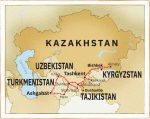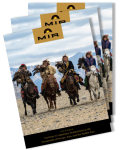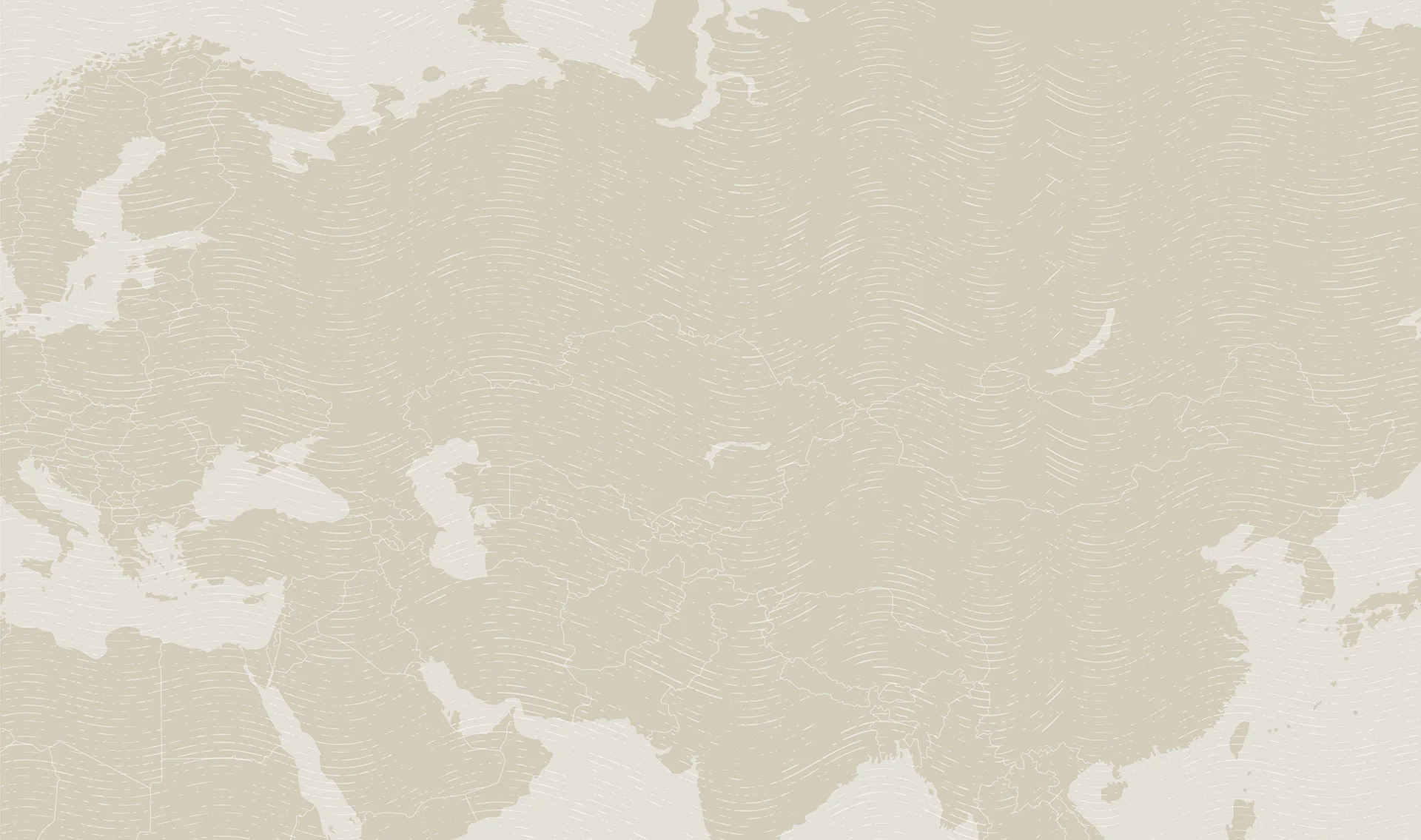Republics of the Silk Road by Private Train - Almaty to Tashkent
Photo credit: Abdu Samadov
From Almaty to Tashkent Aboard the Golden Eagle
Overview
Discover the incredible history and diversity of the Silk Road on this epic rail journey by private train, experiencing the fabled five ’Stans of Central Asia and six UNESCO World Heritage Sites along the way. Explore fabled oasis cities, ancient archaeological sites, and intriguing modern monuments; and witness the artistic and cultural traditions that have sustained this multifaceted region for centuries.
Travels to: Kazakhstan, Kyrgyzstan, Tajikistan, Turkmenistan, Uzbekistan
Photos and details: Discover what life is like aboard the Golden Eagle.

Map

Itinerary
-
Days 1-2: Almaty (Kazakhstan)

The journey begins in Almaty, Kazakhstan’s largest city and a thriving business center situated amid the majestic Tien Shan mountain range. Visit Panfilov Park, a hub of the city and home to Zenkov Cathedral, and join your fellow travelers for a welcome dinner.
HIGHLIGHTS
- Welcome Dinner in Almaty to meet the other travelers in the group
- Panfilov Park, a green oasis in the middle of Almaty where locals meet to stroll and unwind
- Colorful Zenkov Cathedral, one of the tallest wooden structures in the world and an impressive feat of engineering that survived a massive 1911 earthquake unscathed
-
Days 3-4: Lake Issyk-Kul (Kyrgyzstan), Bishkek, Tashkent (Uzbekistan)

Enter Kyrgyzstan and examine petroglyphs and watch a demonstration of traditional Kyrgyz hunting eagles near the shores of alpine Lake Issyk-Kul. Then tour its capital, Bishkek, which is filled with striking Soviet-era statues and monuments. Later, stop in Tashkent, Uzbekistan’s capital and largest city, where a visit to a small library in the Old Town provides the opportunity to see one of Islam’s most sacred relics – one of the world’s oldest Korans.
HIGHLIGHTS
- Lovely Lake Issyk-Kul, the second-largest high-altitude lake in the world
- The Bronze Age petroglyphs along Lake Issyk-Kul’s shores
- The fierce grace of Kyrgyz hunting eagles
- The Soviet-era monuments of Bishkek
- Seeing the Uthman Koran, believed to be one of the world’s oldest
-
Day 5-7: Bukhara, Merv (Turkmenistan), Ashgabat

Spend a day in beautiful Bukhara, Central Asia’s most ancient living city. Its UNESCO-listed Old Town encompasses more than 140 protected monuments, including the Labi-Hauz Plaza at the heart of the city and the Ark Citadel, Bukhara’s original fortress. Cross into Turkmenistan and head to the to the UNESCO-listed ruins of Merv, a city of Bronze Age origin. It was such an important Silk Road stop that it grew into one of the world’s largest cities, only to be brutally sacked by the Mongols in the 13th century. Continue to modern capital of Ashgabat. Explore the flamboyant gilded architecture that has sprung from the rubble of a massive 1948 earthquake and gain insight into the country’s history and culture at the beautifully situated National Museum.
HIGHLIGHTS
- Bukhara’s evocative Old Town, with its ageless domed bazaars
- Central Labi-Hauz Plaza, adorned with a reflecting pool
- Ark Citadel, Bukhara’s giant ancient fortress
- The vast archaeological site of Merv, one of the world’s great lost cities
- The opulent modern architecture of Ashgabat, which holds a Guinness record for the highest density of white marble buildings in the world
- An optional nighttime visit to the Darvaza flaming gas crater
-
Days 8-10: Khiva (Uzbekistan), Shahrisabz, Dushanbe (Tajikistan)

Visit the Uzbek city of Khiva, the last great oasis on the northern caravan route. Wander through the winding alleys of the UNESCO-listed Old Town filled with minarets, cobbled alleys, mosques, and the beautifully preserved Kunya Ark, the original residence of the ruling khans. Make a stop at Shahrisabz, Tamerlane’s birthplace and visit the UNESCO-listed ruins of his Ak Saray (White Palace). Then enter Tajikistan and make a stop at its capital, Dushanbe, to tour the opulent, modern Navruz Palace.
HIGHLIGHTS
- Khiva’s Old Town (Ichon-Qala in Uzbek), a UNESCO World Heritage Site
- Tash-Hauli Palace, built in the 19th century for the khan and his four wives
- Juma Mosque, famous for its carved wooden pillars
- Kunya Ark, the original residence of Khiva’s khans
- Shahrisabz’s Ak Saray, a monumental palace complex that was one of Tamerlane’s most ambitious architectural undertakings
- Giant Navruz Palace in Dushanbe, originally built to be Central Asia’s largest teahouse
-
Days 11-14: Samarkand (Uzbekistan), Fergana Valley, Tashkent

Continue to the Silk Road oasis city of Samarkand, the 14th-century conqueror Tamerlane’s legendary capital, hailed by UNESCO as “the crossroad of cultures.” Take in the massive Bibi Khanum Mosque, Ulug Bek’s incredible observatory, and gracefully proportioned Registan Square. Dip down into the Fergana Valley, where lush farmland stretches into three of the five ’Stans. Visit a traditional silk-making factory in the ancient city of Margilan and a family-run ceramics studio in Rishtan. In the town of Kokand, visit a 19th-century khan’s grand palace. Your journey concludes in Tashkent with a farewell dinner.
HIGHLIGHTS
- UNESCO-listed Samarkand’s Registan Square, bordered by three beautiful madrassahs
- Tamerlane’s architectural legacy in Samarkand, including Bibi Khanum Mosque, the largest mosque of its day
- Shah-i-Zinda, a row of mausoleums and tombs that collectively span the history of Samarkand
- Ulug Bek Observatory, where Tamerlane’s grandson made historic advances in astronomy
- Yodgorlik Margilan Factory, one of Uzbekistan’s finest silk makers
- Khudayar Khan’s 113-room palace in Kokand, known in the 19th century as one of Central Asia’s most luxurious palaces, now partly restored to its former glory
- Farewell dinner back in Tashkent
Dates & Prices
Minimum group size: Minimums vary – call for confirmation status
Land Tour Price, Per Person.
-
2025 Dates
Apr 20 - May 3Sept 27 - Oct 10Note, this tour also runs in the opposite direction, Tashkent to Almaty, call for details.Silver Class, double occupancy$25,695Silver Class, single occupancy$38,495Gold Class, double occupancy$33,195Gold Class, single occupancy$54,695Imperial Suite Class, double occupancy$60,395Imperial Suite Class, single occupancy$119,495
-
2026 Dates
Apr 14 - 27Note: this tour also runs in the reverse, Tashkent to Almaty - please call for details!Sept 29 - Oct 12Silver Class, double occupancy$26,900Silver Class, single occupancy$40,400Gold Class, double occupancy$34,900Gold Class, single occupancy$57,400Imperial Suite Class, double occupancy$63,400Imperial Suite Class, single occupancy$125,500
What's Included
-
Tour Includes
- Accommodation aboard the Golden Eagle private train.
- Hotel accommodation per the itinerary (1 night Almaty; October 2024 departure adds 1 night Tashkent as well).
- All meals starting with dinner on Day 1 until breakfast on final tour day, including a generous, though not unlimited, allowance of wine or local beer, soft drinks and water with all lunches and dinners.
- Arrival/departure transfers, provided you arrive and depart on the tour start/end dates and in the tour start/end cities.
- All guided off-train tours per itinerary.
- The services of an experienced Train Tour Manager, with local guides for scheduled off-train touring.
- Complimentary tea, coffee and mineral water round the clock from your car attendant while on board the train.
- All gratuities.
- Baggage handling.
- Complete pre-departure electronic document that includes detailed packing suggestions, reading list links, country-specific information, maps, travel tips and more.
- Customized visa application and instruction kit (please note, visa fees are not included in the tour price).
- Electronic final update bulletin, with any late news, updates and important information.
- Assistance booking your custom flight arrangements, on request. (Please note that international airfare is not included in the land tour cost.)
-
Not Included
- International airfare or surface transport to the point of joining/leaving the tour. MIR is able to arrange your air itinerary in economy or business class. If you wish to obtain an air quote, please contact us for details.
- Meals and drinks not specified as included in the itinerary.
- Single supplement (difference between double rate and single occupancy rate) if requested or required.
- Optional pre- or post-tour extensions.
- Expenses incurred as a result of delay, modification, or extension of a tour due to causes beyond MIR’s control.
- Visa fees, excess baggage charges, airport departure taxes, vaccination and other medical costs.
- Travel insurance including cancellation, medical, and evacuation insurance.
- Items of a purely personal nature (laundry, telephone, bar account, photography at museums, etc).
Activity Level
-
Level 2: Moderate
Level 2: Moderate
This rail journey by private train features significant touring on foot, throughout which travelers are expected to keep up with other group members. Walking during touring days will be on a variety of surfaces, with many streets and sidewalks being uneven, and elevators generally not available during touring excursions – leading to some stair climbing. Challenges on board the train include long onboard distances with heavy doors, as well as steep steps and gaps to navigate while embarking and disembarking. Only those willing to accept local standards of amenities and services should consider joining this program.
Travelers must be able to walk a mile per day keeping up with other group members. Streets and sidewalks can be uneven or unexpected surfaces, and handrails are not always present. Steps, which may be required due to lack of elevators, may be steep and/or uneven, and may also lack handrails. The distance on board the train between sleeping and dining carriages may be significant, and there are many heavy doors to navigate when moving throughout the train. Getting on and off the train involves navigating steep steps, low platforms, and possible gaps between the train and the platform. Navigating rail stations may also involve traveling up and over steep steps/footbridges to cross tracks, or steep steps and dark tunnels to cross under to/from the train station. Although porterage is provided where possible, you may have to carry your baggage for short distances.
General shortcomings of the tourism infrastructure may include problems with bureaucratic service and availability and quality of public restrooms when not on board the train.

























